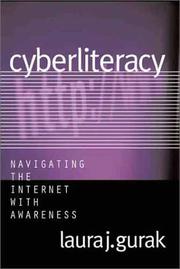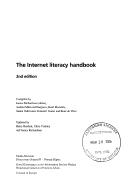| Listing 1 - 10 of 51 | << page >> |
Sort by
|

ISBN: 0300089791 Year: 2001 Publisher: New Haven (Conn.): Yale university
Abstract | Keywords | Export | Availability | Bookmark
 Loading...
Loading...Choose an application
- Reference Manager
- EndNote
- RefWorks (Direct export to RefWorks)
Internet literacy. --- Cyberculture --- Internet literacy --- Net literacy --- Information literacy

ISBN: 128173084X 9786611730840 0300130724 9780300130720 0300089791 9780300089790 0300101570 9780300101577 Year: 2001 Publisher: New Haven
Abstract | Keywords | Export | Availability | Bookmark
 Loading...
Loading...Choose an application
- Reference Manager
- EndNote
- RefWorks (Direct export to RefWorks)
The Internet has changed our social spaces, our political and social realities, our use of language, and the way we communicate, all with breathtaking speed. Almost everyone who deals with the Internet and the new world of cyberspace communication at times feels bewildered, dismayed, or even infuriated. In this clear and helpful book, computer communications scholar Laura J. Gurak takes a close look at the critical issues of online communication and discusses how to become literate in the new mass medium of our era. In cyberspace, Gurak shows us, literacy means much more than knowing how to read. Cyberliteracy means being able to sort fact from fiction, to detect extremism from reasonable debate, and to identify gender bias, commercialism, imitation, parody, and other aspects of written language that are problematic in online communication. Active reading skills are essential in cyberspace, where hoaxes abound, advertising masquerades as product information, privacy is often compromised, and web pages and e-mail messages distort the truth. Gurak analyzes the new language of the Internet, explaining how to prepare for its discourse and protect oneself from its hazards. This book will appeal to anyone with an interest in the impact of the Internet on the practices of reading and writing and on our culture in general.
Internet literacy. --- Net literacy --- Information literacy
Book
ISBN: 022676611X 9780226766119 Year: 2021 Publisher: Chicago: The University of Chicago Press,
Abstract | Keywords | Export | Availability | Bookmark
 Loading...
Loading...Choose an application
- Reference Manager
- EndNote
- RefWorks (Direct export to RefWorks)
"Since its original publication in 2015, Information Now has helped college students address this fundamental issue in the form of a short, humorous graphic guide. It explains how information is organized, both on the open web and in library resources, and how to navigate those sources to find good, trustworthy answers. But the information landscape has changed dramatically in just a few years, and this revised edition explores new questions about who has access to information and about algorithmic bias in how search engines present results. The book also covers online misinformation and offers simple strategies for fact-checking websites. In addition to this expanded topical coverage, the new edition includes revised critical thinking exercises in every chapter to help students feel more engaged in improving the information landscape"--
Information literacy --- Internet literacy --- Library research
Book
ISBN: 2738186610 Year: 2000 Publisher: Paris, France : Odile Jacob,
Abstract | Keywords | Export | Availability | Bookmark
 Loading...
Loading...Choose an application
- Reference Manager
- EndNote
- RefWorks (Direct export to RefWorks)
Pierre Lévy, philosophe des mutations techniques et culturelles, dresse le bilan des conséquences humaines et métaphysiques de la montée de la conscience planétaire.
Philosophy, Modern. --- Economics --- Internet literacy. --- Sociological aspects.
Periodical
Year: 2004 Publisher: Glasgow : University of Glasgow,
Abstract | Keywords | Export | Availability | Bookmark
 Loading...
Loading...Choose an application
- Reference Manager
- EndNote
- RefWorks (Direct export to RefWorks)
Book
ISBN: 9781788116572 9781788116565 Year: 2021 Publisher: Cheltenham Edward Elgar Publishing
Abstract | Keywords | Export | Availability | Bookmark
 Loading...
Loading...Choose an application
- Reference Manager
- EndNote
- RefWorks (Direct export to RefWorks)
This cutting-edge Handbook offers fresh perspectives on the key topics related to the unequal use of digital technologies. Considering the ways in which technologies are employed, variations in conditions under which people use digital media and differences in their digital skills, it unpacks the implications of digital inequality on life outcomes.
Human-computer interaction --- Internet literacy. --- Social stratification --- Mass communications
Book
ISBN: 1783305134 1783305126 Year: 2022 Publisher: London : Facet,
Abstract | Keywords | Export | Availability | Bookmark
 Loading...
Loading...Choose an application
- Reference Manager
- EndNote
- RefWorks (Direct export to RefWorks)
Sustainable development can only be achieved when no one is left behind. An enduring lesson from the COVID-19 crisis is how important the availability of digital infrastructure and skills for individuals and communities is for teaching, learning, employability or just being able to participate fully in society. Digital literacy has become critical for millions all over the world and the need has been keenly felt in Africa, where so many have had to quickly adapt and use online platforms for various purposes. The African library sector has been a key advocate for digital literacy across the nation. But what has been achieved and how? How has digital literacy assisted user communities? What remains to be done?
This important book features contributions from libraries across Africa outlining how they have approached the shift towards a better and more widespread digital literacy. Coverage includes:
- how in Kenya, in line with the country's national vision, libraries have been teaching their user communities, including deaf children, to ably operate in online spaces
- the role of digital literacy in increasing employability in Tunisia
- the efforts of the Ghana Library Authority, the National Library of Nigeria and the City of Johannesburg Library, South Africa in driving digital literacy through eLearning initiatives and other digital services
- insights into the level of digital skills of students in Uganda and how tertiary institutions in Botswana have been moving to teaching and learning on digital platforms.
Computer literacy --- Internet literacy --- Libraries and the Internet
Book
ISBN: 9780226822068 Year: 2023 Publisher: Chicago The University of Chicago Press
Abstract | Keywords | Export | Availability | Bookmark
 Loading...
Loading...Choose an application
- Reference Manager
- EndNote
- RefWorks (Direct export to RefWorks)
"These days, the world wide web has become the Wild West. We are faced with a seemingly endless source of information, all of it difficult to evaluate. Trusted sources can be full of ads, bad actors can slip under the radar, and seemingly questionable databases might hold a helpful treasure trove. Historian Sam Wineburg and media literacy guru Mike Caulfield are here to help with this informative, approachable guide to navigating the internet. With this illustrated tool kit, readers will learn to identify red flags, get quick context, and make better use of common tools like Google and Wikipedia that have the ability to help and hinder in equal measure"--
Internet literacy --- Internet searching --- Information literacy --- Verification (Empiricism)
Book
ISBN: 1637424175 Year: 2023 Publisher: New York, NY : Business Expert Press, LLC,
Abstract | Keywords | Export | Availability | Bookmark
 Loading...
Loading...Choose an application
- Reference Manager
- EndNote
- RefWorks (Direct export to RefWorks)
Currently, every company, no matter its size, is data-driven in one way or another; using data to improve customer experience, as a new value stream, and to stay competitive. However, many business leaders, professionals, and students-such as executives, business analysts, UI/UX designers, project managers and marketing teams -are forced to interact with data and those who generate data, without being taught the general competencies needed to feel comfortable having these conversations. This book focuses on the foundations needed to be successful in managing and engaging with data analytics initiatives, bridging the gap between creators and users of data. As a management reference guide, it discusses the different types of data strategy needed for succeeding with data, covering topics such as data team composition, types of data analytics, the importance of data storytelling, and identifying data ROI.
Success in business. --- Information society. --- Computer literacy. --- Internet literacy.

ISBN: 9287159394 9789287159397 Year: 2006 Publisher: Strasbourg Council of Europe
Abstract | Keywords | Export | Availability | Bookmark
 Loading...
Loading...Choose an application
- Reference Manager
- EndNote
- RefWorks (Direct export to RefWorks)
Internet --- Utilisation --- uses --- Internet literacy. --- 193 Kinderrechten en Media --- Net literacy --- Information literacy --- 193 Kinderrechten en Media. --- Internet literacy
| Listing 1 - 10 of 51 | << page >> |
Sort by
|

 Search
Search Feedback
Feedback About UniCat
About UniCat  Help
Help News
News